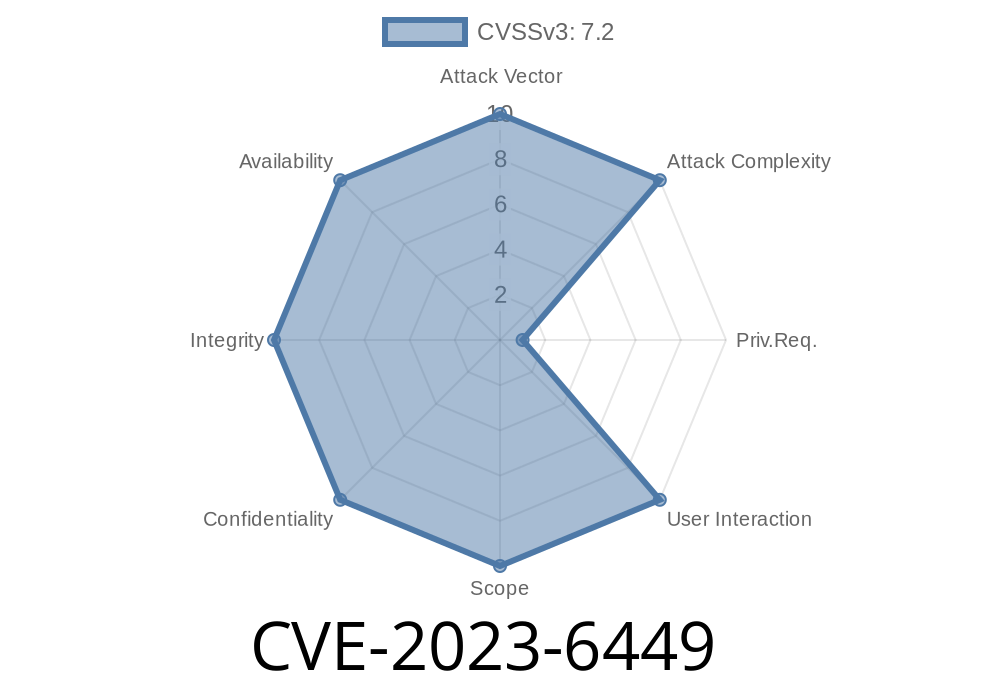In late 2023, a critical security issue was found in Contact Form 7, one of the world’s most popular WordPress plugins. CVE-2023-6449 centers on improper file type validation, allowing authenticated attackers to upload arbitrary files to the WordPress server. While the default plugin settings try to delete these files automatically, certain edge cases—including specific server setups or when other vulnerable plugins are installed—can let these files stick around, potentially leading to remote code execution.
This article explains how CVE-2023-6449 works, the affected code, real-life exploit possibilities, and how you can protect your site.
What’s the Vulnerability?
Contact Form 7 lets website owners create forms easily, including file upload fields for things like resumes or images. The issue comes down to two weak spots:
The wpcf7_antiscript_file_name function doesn’t blocklist dangerous file names thoroughly
Affected versions: All up to and including 5.8.3.
Attackers need:
A WordPress user account with editor-level access or higher.
- Some way to bypass default file deletion and/or exploit with another vulnerability.
Technical Deep Dive: The Problem in the Code
Let’s look at how file uploads are handled inside Contact Form 7.
Inside the plugin, two functions are central to handling file uploads
// Inside includes/validation.php
function validate( $uploaded_file ) {
$file_type = wp_check_filetype( $uploaded_file['name'] );
// Weak: Only checks extension, not true file content
if ( ! in_array( $file_type['ext'], $allowed_types ) ) {
return false;
}
// ...proceeds without further validation...
}
// Inside includes/file.php
function wpcf7_antiscript_file_name( $filename ) {
$blacklist = array('php', 'exe', 'sh', 'bat');
// Weak: Just looks for extension, attackers can bypass with double extensions like 'shell.php.jpg'
foreach ($blacklist as $ext) {
if (preg_match('/\.'.$ext.'$/i', $filename)) {
// Reject file
return false;
}
}
// ...proceeds without further validation...
}
What’s the issue?
Attackers can upload files with crafted names (like shell.php.jpg). Since only the extension is checked, and not the real file type or content, dangerous files pass through.
What Happens on the Server?
By default, Contact Form 7 deletes uploaded files right after the form submission completes. Also, .htaccess is often configured to prevent code execution in the upload directory.
But, as Patchstack’s report explains, other plugins or server configurations can let the file stick around, or move it to a location where it can be executed.
The plugin will incorrectly validate this file and save it in the uploads folder temporarily.
5. If your server or a third-party plugin forgets to delete/moves this file, and if another vulnerability allows you to include that file as .php, then Remote Code Execution (RCE) is possible.
Simple Upload Request Example
curl -X POST -F "your-name=Attacker" -F "your-file=@shell.php.jpg" \
https://example.com/wp-admin/admin-ajax.php?action=wpcf7_submit
Update to Contact Form 7 v5.8.4 or later
Never let untrusted users have editor or administrator accounts.
- Use security plugins that scan/fix vulnerable file upload handlers.
Monitor Uploaded Files
- Use plugins or scripts to log changes in wp-content/uploads/.
References & Learn More
- CVE-2023-6449 at NVD
- Contact Form 7 Security Notice
- Patchstack Vulnerability Report
- Wording of Official Disclosure
Conclusion
CVE-2023-6449 reminds us that even big, trusted plugins can have critical flaws, especially around file uploads. While the immediate risk is moderated by smart defaults, WordPress admins must always update plugins, follow best security practices, and watch out for plugin interactions that could let a simple arbitrary file upload bug escalate into a full site takeover.
If you’re running Contact Form 7, update now. And keep an eye out—file upload vulnerabilities never really go away!
Timeline
Published on: 12/01/2023 11:15:08 UTC
Last modified on: 12/06/2023 20:56:48 UTC
